|
|
|
Sort Order |
|
|
|
Items / Page
|
|
|
|
|
|
|
| Srl | Item |
| 1 |
ID:
190422
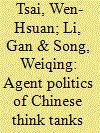

|
|
|
|
|
| Summary/Abstract |
This paper analyzes the relationship between the Chinese government and domestic think tanks. Chinese think tanks in the cultural sector have a strong demand-side orientation; that is, they closely follow the instructions of the Chinese Communist Party (CCP) in their stand on culture-related policies. Since 2018, the CCP has strengthened its control over the propaganda and cultural affairs, using think tanks to this end. Think tanks act as dual agents, maximizing the benefits offered by their two principals – the party government and private businesses, while prioritizing the former. The paper examines the development of the Putuo Island Park in Zhejiang Province and the Cultural Industry Research Institute, the key cultural industry think tank in this province. While upholding Xi Jinping’s aspiration of developing China into a “cultural great power,” cultural think tanks’ main function is to endorse government policies and guide businesses to support those policies when necessary. The CCP under Xi has intensified its manipulation of think tanks to reinforce its control over ideology and the socialist market economy, resulting in a more complex relationship between the state and think tanks.
|
|
|
|
|
|
|
|
|
|
|
|
|
|
|
|
| 2 |
ID:
141082
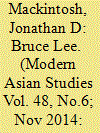

|
|
|
|
|
| Summary/Abstract |
Fist of Fury, starring Bruce Lee, debuted in Japan in 1974. Whilst its critical reception reflected its box-office success, a complex emotional reaction is nevertheless detectable towards the film's unsympathetic portrayal of the Japanese. This paper will explore this reaction and suggest that a post-colonial angst was piqued, one that betrayed fundamental shifts in current racial, erotic, cultural, moral, and historical understandings of Japanese manliness. At one level, the response to Lee is a hermeneutic cue into the manifold ways that this angst was constructed through contesting understandings of an emergent China and unresolved memories concerning failed imperial Japanese adventure. At another level, the phenomenon of Lee's Japanese reception points to longer-term shifts in the visual-cultural representation of masculinity: vulnerability as articulated in the cinema's ‘new man’, male nudity as ‘discovered’ in women's magazines, and most potently, modern Japanese manliness to challenge American neo-colonial hegemony. It is this panorama of masculinity that this paper seeks to open through an inter-disciplinary survey of a variety of media—film, pulp fiction, women's magazines, and homo porn; a panorama into which Bruce Lee exploded on screen, alerting us to the images and contradictory aspirations that script a visual poetry of Japanese manliness.
|
|
|
|
|
|
|
|
|
|
|
|
|
|
|
|
| 3 |
ID:
068749
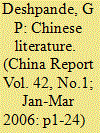

|
|
|
| 4 |
ID:
067861
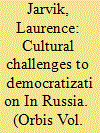

|
|
|
| 5 |
ID:
172250
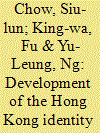

|
|
|
|
|
| Summary/Abstract |
This study deployed a systematic method to develop and validate a measurement for the identity of Hong Kong people, reflecting the emerging localistic attitude in the city. Drawing on a two-dimensional identity model, a combination of cultural and civic domains, an operationalization for Hong Kong identity was derived to differentiate between ‘HongKongese’ and others with stronger Mainland-Chinese-oriented identity. Cultural attribute, such as language and choice of technology products, is found to be of paramount importance in identity confirmation. Anti-authoritarianism and proactive political participation are the two major discriminatory features in the civic domain. Social distance from Mainland Chinese is positively associated with these key components of the scale, supporting the scale’s construct validity and confirming the nativist tendency of certain groups of Hong Kong localists.
|
|
|
|
|
|
|
|
|
|
|
|
|
|
|
|
| 6 |
ID:
105193
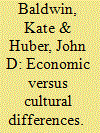

|
|
|
|
|
| Publication |
2010.
|
| Summary/Abstract |
Arguments about how ethnic diversity affects governance typically posit that groups differ from each other in substantively important ways and that these differences make effective governance more difficult. But existing cross-national empirical tests typically use measures of ethnolinguistic fractionalization (ELF) that have no information about substantive differences between groups. This article examines two important ways that groups differ from each other-culturally and economically-and assesses how such differences affect public goods provision. Across 46 countries, the analysis compares existing measures of cultural differences with a new measure that captures economic differences between groups: between-group inequality (BGI). We show that ELF, cultural fractionalization (CF), and BGI measure different things, and that the choice between them has an important impact on our understanding of which countries are most ethnically diverse. Furthermore, empirical tests reveal that BGI has a large, robust, and negative relationship with public goods provision, whereas CF, ELF, and overall inequality do not.
|
|
|
|
|
|
|
|
|
|
|
|
|
|
|
|
| 7 |
ID:
115040


|
|
|
|
|
| Publication |
2012.
|
| Summary/Abstract |
South Africa has experienced two periods of contrasting nation-building, with apartheid's exclusionary ideology of separate development contrasting with the inclusive nationhood discourse of the democratic period. Throughout these periods, the South African government has utilised iconography within the cultural landscape in efforts to promote the changing national narrative to domestic and international audiences. Analysis of postage stamps issued by the South African government during and after apartheid demonstrate the continuing evolution of nationalism and identity. The appropriation of the iconographic power of postage stamps by the ANC, through their production of propaganda postage labels during the 1980s, reinforces the importance of such ephemeral, quotidian objects while complicating national narratives presented in official philatelic issues.
|
|
|
|
|
|
|
|
|
|
|
|
|
|
|
|
| 8 |
ID:
151295
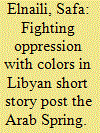

|
|
|
| 9 |
ID:
139039
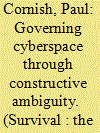

|
|
|
|
|
| Summary/Abstract |
At its simplest, cyberspace is a global medium for communication and information exchange between computers and their human operators, an environment (of sorts) in which it is possible for digital signals to be sent, received and processed. Like other communications media, the operating
conceit of cyberspace is that it should be indifferent to the quality and meaning of the traffic it carries. It comes as no surprise, then, that cyberspace can be a vehicle for challenge, insecurity, instability, crime and competition. But it can just as often signify opportunity: commercial, economic, cultural, political, social and even moral, in terms of individual human fulfilment.
|
|
|
|
|
|
|
|
|
|
|
|
|
|
|
|
| 10 |
|
| 11 |
ID:
031229
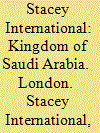

|
|
|
|
|
| Publication |
London, Stacey International, 1977.
|
| Description |
256p.: maps, diagramshbk
|
| Standard Number |
0905743040
|
|
|
|
|
|
|
|
|
|
|
|
Copies: C:1/I:0,R:0,Q:0
Circulation
| Accession# | Call# | Current Location | Status | Policy | Location |
| 017301 | 953.8/STA 017301 | Main | On Shelf | General | |
|
|
|
|
| 12 |
ID:
173787
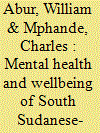

|
|
|
|
|
| Summary/Abstract |
The majority of South Sudanese-Australians arrived in Australia, and other host countries outside Africa, after spending a greater part of their lives in refugee camps or conflict-affected areas. In addition, refugees are often not able to return to their home countries because the causes of their departure (wars, insecurity, hunger) continue to apply in their country of origin. The purpose of this paper is to examine some of the mental health and wellbeing issues some South Sudanese-Australians experience as a result of settlement difficulties and their earlier experience of conflict. The study looks at experiences of resettlement and settlement difficulties, and, more importantly, mental health and wellbeing issues in the wake of the aforesaid challenges. The data was collected from a qualitative method which comprised a series of semi-structured, one-on-one interviews with a total of 20 South Sudanese-Australians living in Melbourne. There were 11 males and nine females, with ages ranging from 18 to 64 years, who volunteered to participate in this study. Findings indicated that, as with many other people from refugee backgrounds, South Sudanese-Australians face a range of settlement-related challenges, and a host of post-resettlement adaptation experiences such as limited change of gender roles, language proficiency, unemployment, host society unacceptance or intolerance, constrained recreational opportunities, lack of community connectedness and overall mental health and general wellbeing issues. Experiencing conflict can be traumatic and refuge in neighbouring countries that are socio-culturally different can be challenging. In conclusion, these issues can not only be troublesome on a day-to-day basis, but also adversely affect the long-term mental health and wellbeing of refugees.
|
|
|
|
|
|
|
|
|
|
|
|
|
|
|
|
| 13 |
ID:
156343
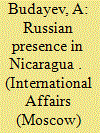

|
|
|
|
|
| Summary/Abstract |
AFTER the Sandinista National Liberation Front (FSLN) took power for a second time in 2007 and its leader, Daniel Ortega, again became president of Nicaragua, Russia's relations with that country have become closer and, moreover, acquired a new quality, developing into full-scale strategic partnership. Today, Nicaragua is Russia's main partner and ally in Central America. Russian presence in Nicaragua takes a diversity of forms - political contacts, economic relations, including trade and investment, cultural, scientific and technological cooperation. There are numerous reasons for this, primarily the two nations' desire to build equal, mutually respectful, and mutually beneficial cooperation in bilateral and multilateral formats, their deep involvement in regional political and economic processes, and their active roles in the world arena, where they hold identical or similar views on practically all key issues.
|
|
|
|
|
|
|
|
|
|
|
|
|
|
|
|
| 14 |
ID:
064864
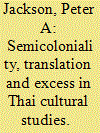

|
|
|
| 15 |
ID:
154459
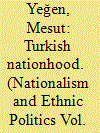

|
|
|
|
|
| Summary/Abstract |
This article challenges two established views in the literature on Turkish nationalism. First, that Turkish nationhood in the early republican era was civic and ethnic and, second, that, while Turkish nationhood was inclusive and egalitarian in constitutional texts, in the early years of the Turkish Republic and in the case of Turkish citizens of Muslim origin, it became exclusive or discriminatory in citizenship practices once the Republic was consolidated and in the case of non-Muslim Turkish citizens. Contra these two established views, I first argue that Turkish nationhood was not civic and ethnic, but it was actually civic and ancestral and cultural. Secondly, relying on an examination of legal texts produced and citizenship practices pursued in the years between 1918 and 1924, I argue that the Turkish nationhood was exclusive and discriminatory both theoretically and practically, on paper as well as in practice, both at the time of the foundation of the republic and once the regime had become consolidated.
|
|
|
|
|
|
|
|
|
|
|
|
|
|
|
|
|
|
|
|
|